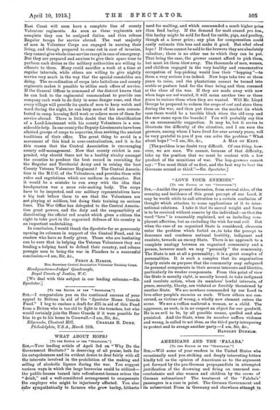WHIT ABOUT HOPS?
[To s117 EOM. 07 7117 •03117C717011.1
SIE,—Your leading article of April 3rd on "Why Do the Government Hesitate ?" is deserving of all praise, both for its outspokenness and its evident desire to deal fairly with all the interests involved in the prohibition of the making and selling of alcoholic liquors during the war. You suggest various ways in which the large breweries could be utilized— the public-houses turned into refreshment-houses minus the "drink," and a well-considered arrangement to compensate the employer who might be injuriously affected. You also refer sympathetically to farmers who grow barley, hitherto used for making, and which commanded a much higher price than feed barley. If the demand for malt ceased pro fees., this barley might be sold for food for cattle, pigs, and poultry, though at a lower price; any plan for compensation could easily estimate this loss and make it good. But what about hops? If these cannot be sold to the brewers they are absolutely valueless; there is no other use to which they can be put. That being the case, the grower cannot afford to pick them, but most let them blow away. The thousands of men, women, and children engaged in the very healthy and remunerative occupation of hop-picking would lose their "hopping "—to them a very serious lose indeed. Now hops take two or three years to raise, and the plantations cannot be turned into arable or pasture land for the time being and then resumed at the close of the war. If they are made away with now when hops are not wanted, it will mean another two or three years to restore them when they are wanted. Will Mr. Lloyd George be prepared to redeem the crops at cost and store them during the war, and then put them on the market (in which case there would be a terrible block when the old crop and the new came upon the boards)? You will probably say this is an unreasonable suggestion. It may be, but it serves to illustrate the difficulty of the situation, and I am sure the growers, among whom I have lived for over seventy years, will be very grateful to you if you can solve the problem "What about hops P "—I am, Sir, de., A MAN OF KENT.
[The problem is no doubt very difficult. Of one thing, how- ever, we are sure. We cannot, because of that difficulty, take up the position that we must he content with a low product of the munitions of war. The hop-growers cannot say : "You must think of us first, and the best way to beat the Germans second or third."—En. Spectator.]






































 Previous page
Previous page